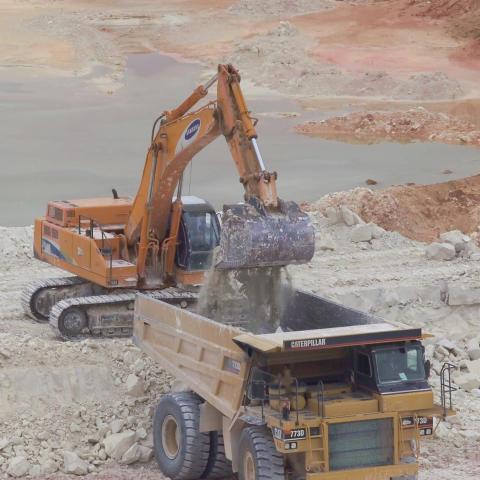Exporter Spotlight: Thiele Kaolin Company

County: Washington
Industry: Manufacturing, Mining
Interviewee Name(s) & Title(s): Alex McAfee, Regional Sales Manager & Randy Mayberry, Director of International Sales
 Thiele Kaolin Company, a privately held business that was founded in 1946, is one the world’s leading sources for processed minerals. With facilities in North America and Europe, Thiele mines, processes and delivers a wide range of kaolin and silica products. They are committed to delivering customer satisfaction, quality products and reliable service.
Thiele Kaolin Company, a privately held business that was founded in 1946, is one the world’s leading sources for processed minerals. With facilities in North America and Europe, Thiele mines, processes and delivers a wide range of kaolin and silica products. They are committed to delivering customer satisfaction, quality products and reliable service.
How long has Thiele Kaolin Company been exporting?
Randy: Thiele Kaolin Company is celebrating its 75th anniversary this fall. Our operations started on January 1st, 1947 and we began exporting in about 1966. We have served the domestic coated paper market for 75 years and are privately held.
All business comes down to relationships and having that stable base to work from. Because we are located in a small town like Sandersville we need to have certain resources and access to infrastructure. This makes all the difference in running a successful export business.
What motivated your company to start selling internationally?
Randy: A Japanese company sought us out in the mid-60s. They made an inquiry and we responded. That relationship still exists. I want to make a plug here for the Georgia Ports Authority – it was the wisdom of the people that started the port that set the ground-work for Thiele. World class shipping facilities showed up in Savannah, Georgia. Shortly after that we started exporting to Italy and started selling bulk kaolin. Then more shipping facilities were built in the mid-80s and kaolin clay became the largest export out of Savannah in that decade. We ship 99% of our exports out of the port of Savannah.
 What is the biggest lesson your company has learned about exporting? How have you been able to incorporate past lessons learned to navigating the current crisis?
What is the biggest lesson your company has learned about exporting? How have you been able to incorporate past lessons learned to navigating the current crisis?
Randy: During the pandemic, Thiele Kaolin was designated an essential industry, we adopted CDC guidelines to keep our workforce safe. Some employees can work from home but we also need the expertise of on-site employees.
A saying I like is “think globally and act locally.” You have got to adhere to local customs and listen to the market. We have been successful because we have wonderful partners (agents and distributors) on the ground in the various countries we export to. I would say listen more and talk less.
How has GDEcD’s International Trade Team helped your company? Or What outside resources have been helpful in achieving success internationally?
Randy: There is no bigger cheerleader for the state, I am a proud Georgian and cannot say enough about the wisdom of those that invested in the infrastructure in Georgia and the ease of doing business in Georgia. Anytime I call someone at the state, the staff are very responsive. When I first heard Mary Waters (Deputy Commissioner, International Trade), speak in Hilton Head at the Clay Producer’s Traffic Association annual meeting two years ago – I had to reach out to your team.
What advice do you have for companies that are just starting to export?
Randy: Seek out as much wise counsel as you can. That means investing in a trusted network of agents and distributors in the countries where you do business. Also, don’t push your way of thinking on the customers. Another saying I like that highlights this is “You can buy in any language, but you have to sell in the local language.” As an exporter, look at the value your product will bring customers from a local perspective. Kaolin clay is unique because it is only available in certain places in the world. If you need to print on coated board or paper you need a little kaolin. We know our product and we research the markets we go into so that we are well-positioned to serve our customers.
 What has been your biggest export achievement?
What has been your biggest export achievement?
Randy: Our company has stayed the course for over 50 years and is the only company in our industry that has not had a name change. Most of the international markets and relationships we developed early on still exist. We have also established relationships in newer markets such as China, and in the Indian-subcontinent, primarily in India but also Pakistan. In the 80s, technology was a blow to our industry and business as the demand for coated paper was falling. We pivoted by focusing on customizing our applications for packaging and other paper-based products.
I like finance and there is a word in finance: diversification. The world does not move in perfect synchrony all the time, some economies go down when others go up, and diversification in exports lends itself to a stronger overall business. Currently we export to many markets and our top export markets include China, India, Japan, Finland, Germany and Sweden.
